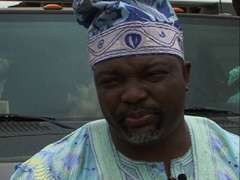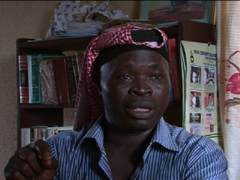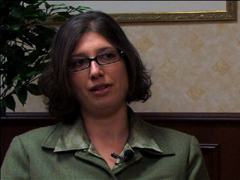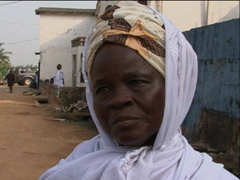In This Episode << SLIDE LEFT TO SEE ADDITIONAL SEGMENTS
Chrislam
FRED DE SAM LAZARO: Nigerians may want for many of life’s basic needs. A house of worship would not seem one of them.
In the largest city, Lagos, there are traditional, old-line churches. But there also are hundreds of banners and posters that invite worshippers to newer smaller congregations. None is more unusual than this one — both Christian and Muslim.
The lectern holds both Quran and Bible. Invocations come loudly from both.
CONGREGANTS: Allahu Akbar!
DE SAM LAZARO: Roughly half of Nigeria’s 140 million people are Muslim; the other half profess some form of Christianity. It’s been a political fault line over the years, and tensions have often erupted in deadly violence. Just last November, more than 300 people were killed in the town of Jos.
Pastor SHAMSUDDIN SAKA (Chrislam Minister, speaking at service): Listen to me. I want you to realize that Abraham had many children.
DE SAM LAZARO: But the 1,500 or so practitioners of what their preacher calls Chrislam see no religious fault line between the two faith groups. Shamsuddin Saka — he’s called Prophet — tells his audience they are all children of Abraham through Judeo-Christian tradition and through Islam.
Pastor SAKA: Abraham is the father of Christianity, the father of Islam. So why the Christians and Muslims are fighting?
DE SAM LAZARO: Saka was born Muslim, and it was after returning from a hajj pilgrimage to Mecca that he was inspired — he says instructed by God — to launch his new ministry
Pastor SAKA: That was about 19 years ago. Then there is a lot of people killing themselves in Nigeria 19 years ago. So I was praying and lying down and the Lord told me, “Make peace between Christian and Muslim.”
DE SAM LAZARO: He said he’s written letters to political leaders and traveled to affected areas when religious violence has broken out, urging reconciliation around common beliefs. But Saka’s most visible impact is in his immediate neighborhood, where he has brought the faiths together in a blended liturgy. It begins each Sunday morning with Quranic prayer in an open floor space that, like a mosque, has no pews. These then give way to prayer with the congregation seated in chairs — well, sometimes seated.
DE SAM LAZARO: This prayer is intense, a trance-like frenzy similar to a Pentecostal Christian service. It climaxes by a sermon from Saka that on this day took almost two hours.
Pastor SAKA (speaking at service): Alleluia!
CONGREGANTS: Alleluia!
DE SAM LAZARO: As different as Christianity and Islam are, there is some common ground.
Dr. ISHAK AKINTOLA (Lagos State University): The Bible, you know, concentrates on teachings of love, that’s what Jesus says in Mathew chapter 5, that you love your neighbor and you even love your enemy. Now you find the Quran saying exactly the same thing.
DE SAM LAZARO: The Quran says the same thing?
Dr. AKINTOLA: Yes, yes. “Pay evil back with goodness.” If you do that, those who used to hate you before, those who are your enemies before will so become your friend. So the Bible [and] Quran say the same thing.
DE SAM LAZARO: Islam was brought here by Arab traders 10 centuries ago, Christianity by European colonization starting in the 15th century. Each has been interpreted and adapted to local needs and customs. That’s noteworthy in the way Islam is sometimes practiced here, free of the rigid dogma often associated with it.
Dr. MARA LEICHTMAN (Assistant Professor, Department of Anthropology, Michigan State University): According to Islam, the Prophet Muhammad was the final prophet but certainly not the only prophet, and they believe in Jesus and all of the other prophets of Judaism and Christianity that came before the Prophet Muhammad. So it’s nothing foreign to a Muslim to believe in Jesus, to pray to Jesus or some of the other prophets, to light a candle for the Virgin Mary, for example, as I’ve experienced Muslims do in churches in Senegal. They believe, in some cases in Africa and various African counties, in what I call “spirituality without boundaries.”
DE SAM LAZARO: In a land where spirituality is a dominant force in people’s lives, she says economic hardships may also push people to try new ideas. Nigeria has vast oil wealth but only a few have benefited. Per capita income is about $85 a year, for example, and life expectancy a mere 45 years
Dr. LEICHTMAN: If they’re poor, if they’re suffering from HIV AIDS, if they’re trying to understand a changing political situation, finding a new religion is one way of coping with the situation, of looking for new leadership of trying to have control on their own through prayer, through different rituals of something that may not necessarily be controllable.
DE SAM LAZARO: Many who come to Chrislam are praying for what Saka calls deliverance — from illness, for example. Cawakalit Adecunji, who was born Muslim, came to Chrislam 15 years ago when she couldn’t have children.
CAWAKALIT ADECUNJI (through translator): I now have children. I came and saw that miracles are performed here. Those who didn’t have children have children. Those who are lame are walking, and the blind are seeing now.
DE SAM LAZARO: At the service, there are petitions for miracles of health and wealth — or at least improved finances
Pastor SAKA (speaking at service): Delay is not denial
DE SAM LAZARO: Delay is not denial, Saka tells his congregants, as he urges prayer and patience. Some people do come up to testify to miracles in their lives — a child conceived or a business deal. Such “deliverance” is mostly associated with some Christian churches, but Saka says it’s not foreign to Islam.
Pastor SAKA: Islam is a religion of peace, of love, of miracles. When you’re talking about miracles, Islam is a miracle itself. The founding of the Quran itself is a miracle.
DE SAM LAZARO: And congregants have taken to heart Saka’s message that to get back one must first give, but he denies that he personally benefits from these gifts. In this milieu of extreme haves and have-nots, Saka insists he always had.
Pastor SAKA: Listen to me, I’m a millionaire before my call. You know, we don’t collect much money. We collect 50, 10 naira, 20 naira. And this money — this is not my only source of income.
DE SAM LAZARO: His fortune came long before his call to ministry, he says, from a real estate business. The Hummer he drives was a gift from two followers whose petitions were answered, and he’s ready for the next automotive miracle.
Pastor SAKA: Do you like it?
DE SAM LAZARO: One miracle even the skeptics give Saka is this congregation and how people see themselves.
(to unidentified male congregant): Are you Christian or Muslim?
UNIDENTIFIED MAN: Whatever you call me, I am.
DE SAM LAZARO: Saka’s Chrislam is not widespread, but even the skeptics say he’s discovered the innate tolerance that’s often overshadowed by violence across religious lines in a service that’s part Muslim, part Christian — and wholly West African.
For RELIGION ÐICS NEWSWEEKLY, this is Fred De Sam Lazaro in Lagos, Nigeria.





